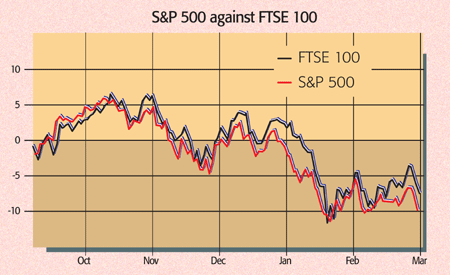Get the latest financial news, insights and expert analysis from our award-winning MoneyWeek team, to help you understand what really matters when it comes to your finances.
You are now subscribed
Your newsletter sign-up was successful
Want to add more newsletters?

Twice daily
MoneyWeek
Get the latest financial news, insights and expert analysis from our award-winning MoneyWeek team, to help you understand what really matters when it comes to your finances.

Four times a week
Look After My Bills
Sign up to our free money-saving newsletter, filled with the latest news and expert advice to help you find the best tips and deals for managing your bills. Start saving today!
"A climate of gloom" has descended on equities, says Dave Shellock in the FT. Stocks headed back towards their lows for the year early this week as US recession fears deepened.
Jobless claims are up, consumer spending is stalling, and the residential housing weakness is spreading across the building industry. America is in recession, inflation could ignite in a "serious way", and shares looked set to get cheaper, says Warren Buffett.
Investors are also realising that the credit crisis isn't going anywhere. Worries over corporate defaults have intensified on both sides of the Atlantic, with an index measuring the risk of default in Europe implying that firms are having to borrow at 6% over risk-free investments.
MoneyWeek
Subscribe to MoneyWeek today and get your first six magazine issues absolutely FREE

Sign up to Money Morning
Don't miss the latest investment and personal finances news, market analysis, plus money-saving tips with our free twice-daily newsletter
Don't miss the latest investment and personal finances news, market analysis, plus money-saving tips with our free twice-daily newsletter
Meanwhile, as the housing market weakens further and defaults rise, losses are spreading beyond subprime. Securities linked to Alt-A mortgages, a step above subprime, have slid by 15% this year, which means more write-offs on Wall Street. Barclays, HBOS and Royal Bank of Scotland revealed £4.9bn, £7bn and £2.2bn of exposure to Alt-A this month, says Christine Seib in The Times.

One symptom of the rot spreading up the scale appeared last week with the liquidation of a $2bn fund at UK hedge fund group Peloton, whose bets on highly-rated mortgage securities misfired as these have slid of late. The leveraged fund was forced by its creditors to sell assets at a discount to meet cash calls. Cash-strapped lenders are increasingly tightening the screws on hedge funds; more "will blow up this year than ever before", says Michael Hennessy of Morgan Creek Capital. And forced sales by hedge funds imply further falls in the values of complex securities, and hence more writedowns.
Expect car, credit card, student and commercial property loans, many of which were parcelled up and sold on, to hit the headlines over the next few months. With commercial property values set to slide by 21%-26% over the next two years, Wall Street banks are likely to write down a joint $7.2bn in the first quarter, reckons Goldman Sachs.
All told, overall credit crunch losses could hit $600bn, reckons UBS. And a group of US economists has calculated that mortgage losses of $400bn would prompt banks to scale back lending to the tune of $2trn, wiping 1%-1.5% off growth. And that's before considering softer consumption and higher energy prices. James Kochan of Wells Fargo sums it up nicely: the size and scope of the difficulties in the credit markets are "the worst I have ever seen".
Get the latest financial news, insights and expert analysis from our award-winning MoneyWeek team, to help you understand what really matters when it comes to your finances.
MoneyWeek is written by a team of experienced and award-winning journalists, plus expert columnists. As well as daily digital news and features, MoneyWeek also publishes a weekly magazine, covering investing and personal finance. From share tips, pensions, gold to practical investment tips - we provide a round-up to help you make money and keep it.
-
 Can mining stocks deliver golden gains?
Can mining stocks deliver golden gains?With gold and silver prices having outperformed the stock markets last year, mining stocks can be an effective, if volatile, means of gaining exposure
-
 8 ways the ‘sandwich generation’ can protect wealth
8 ways the ‘sandwich generation’ can protect wealthPeople squeezed between caring for ageing parents and adult children or younger grandchildren – known as the ‘sandwich generation’ – are at risk of neglecting their own financial planning. Here’s how to protect yourself and your loved ones’ wealth.

